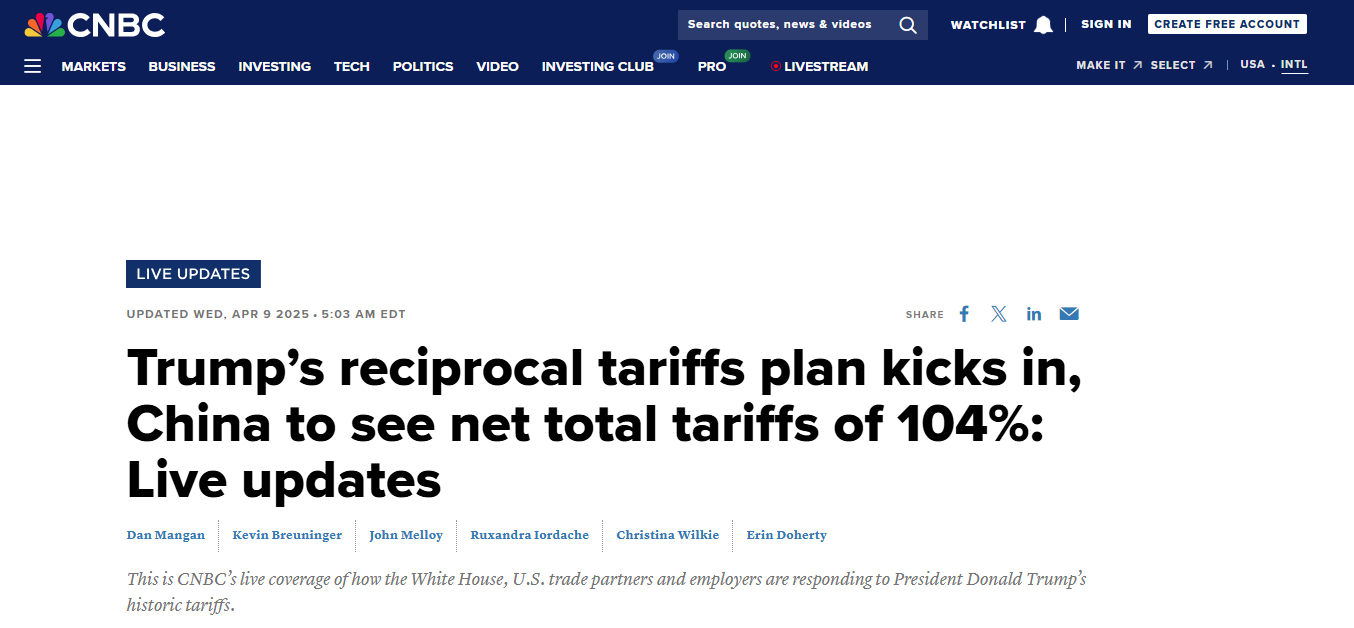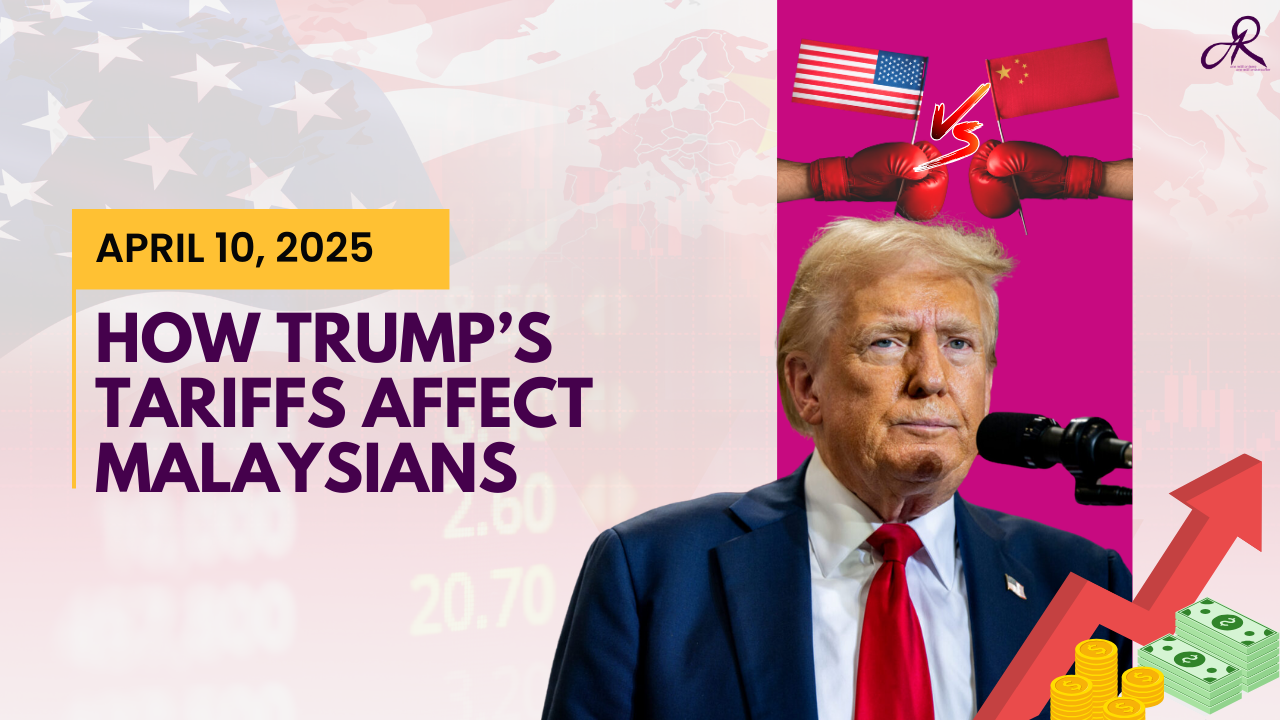Recently, former U.S. President Donald Trump announced new tariffs (taxes) on products coming from China. This move has raised concerns worldwide, including in Malaysia. While it’s meant to help U.S. industries by encouraging local production, it’s going to affect us here as well—raising the cost of goods and impacting businesses and consumers.
Source: CNBC

What Are Tariffs?
A tariff is essentially a tax imposed on imported goods. When tariffs are added, the price of imported products increases. This is meant to encourage people to buy locally-produced goods, but it comes with a catch: many products we use in Malaysia, such as electronics, clothes, and food, are imported from other countries, especially China.
With Trump’s tariffs on Chinese goods set at 104%, products from China are going to get more expensive. This means that Malaysians, like consumers everywhere, will feel the pinch in their wallets.
How This Affects Us as Individuals
You might think this is only a problem for Americans, but the truth is that the new tariffs are going to raise the cost of many products in Malaysia too. The things we buy every day, from phones to clothes, often come from China or other countries affected by these tariffs. So, the prices of those items are expected to go up.
For Malaysian families, this could mean higher costs for products that are already essential to daily life. Whether it’s upgrading your phone, buying groceries, or getting a new pair of shoes, everything could cost more. This could be especially tough for middle-income families, who are already facing the challenge of rising living costs.
Impact on Businesses in Malaysia
It’s not just consumers who will feel the effects. Small businesses in Malaysia are also going to face higher costs. Many small businesses rely on products from China—whether it’s raw materials or finished goods. For example, a local shop selling affordable electronics or fashion items may see their supply costs rise because the products they import from China are now more expensive.
These businesses will have a choice: they can raise prices to cover the extra cost, which could reduce sales, or they could absorb the cost themselves, which could hurt their profits. In either case, many small businesses will struggle to stay afloat. Some might even have to cut back on their offerings or reduce the number of employees to cope with the financial strain.
Workers in Malaysia: Job Uncertainty Ahead
Workers in industries that rely on imported goods will also feel the effects of these tariffs. When the cost of goods increases, businesses often have to find ways to cut costs. This might mean reducing staff, cutting hours, or freezing wages. In Malaysia, workers in retail, manufacturing, and technology industries are particularly vulnerable.
For example, those working in the retail sector may see fewer job opportunities as businesses struggle to deal with higher costs. Similarly, workers in manufacturing, where raw materials are affected by the tariffs, might find their hours reduced as production slows down.
Supply Chains Disrupted: What Does This Mean for Malaysians?
In Malaysia, like many other countries, businesses rely on products and raw materials from around the world, including China. When tariffs are added, everything from smartphones to clothes becomes more expensive. As a result, global supply chains, the system that moves goods from one place to another, are disrupted.
For example, if a Malaysian company relies on computer parts from China, those parts will now cost more. This will increase the price of the finished product, such as laptops or phones, and consumers will ultimately end up paying more. This disruption also causes delays, as businesses try to find new suppliers or adjust to the higher costs.
What’s Next for Malaysians?
The long-term effects of Trump’s tariffs are still unclear, but it’s likely that prices for many goods in Malaysia will continue to rise. The goal of the tariffs is to reduce America’s reliance on Chinese imports and encourage domestic production. But this shift won’t happen overnight, and in the meantime, families and businesses in Malaysia will need to deal with the higher costs of imported goods.
What Can Malaysians Do?
For consumers, it’s important to be aware of rising prices. If you’re in the market for items like electronics or clothing, consider shopping around for better deals or looking for sales. You might also want to explore local alternatives to imported goods, which could help keep costs down.
For small business owners, it’s essential to manage costs carefully. Look for new suppliers or try to adjust your pricing strategies in a way that helps you stay competitive. Flexibility and planning will be key in staying ahead of these price changes.
For workers, being open to learning new skills and staying adaptable will be crucial in a job market that could become more uncertain due to rising costs and economic shifts.
Conclusion: Adapting to a Changing Economy
Trump’s tariffs are making waves, not just in the U.S., but also here in Malaysia. While the full impact is still unfolding, we can expect higher prices and economic challenges in the months to come. Staying informed and adaptable is the best way for Malaysian families, small businesses, and workers to navigate the uncertainty that comes with these changes.
By understanding the impact of the tariffs, we can better prepare ourselves for the adjustments we need to make to keep our finances stable and our businesses running smoothly.
Want to know more?
If you want to dive deeper into how these tariffs will affect you and your business, and to get actionable insights on how to navigate these changes, join our upcoming Women & Wealth Masterclass.

We’ll cover everything from the impact of Trump’s tariffs on global and local markets to practical strategies that can help you stay ahead.
This is your opportunity to understand the full picture and gain valuable tools to protect your financial future. Don’t miss out on this exclusive session—REGISTER NOW and secure your spot!
For those seeking guidance on a more profound journey towards financial independence and lasting impact, our eBook, offers strategies to enhance your approach. Turning your wealth into good is not simply an act; it is a commitment. It is a powerful declaration that with wealth comes responsibility, and with compassion comes change.








